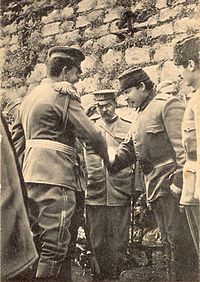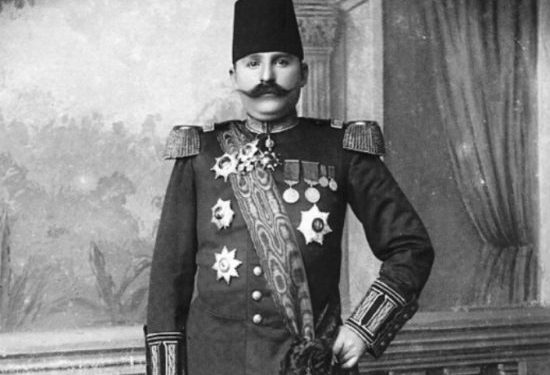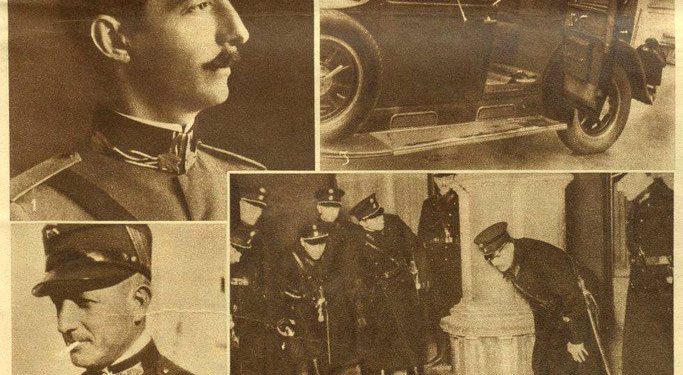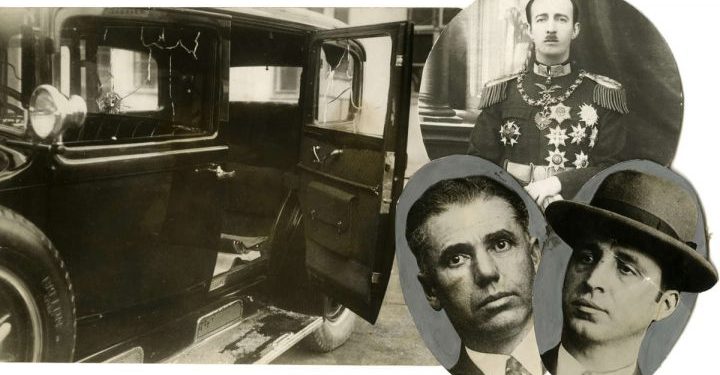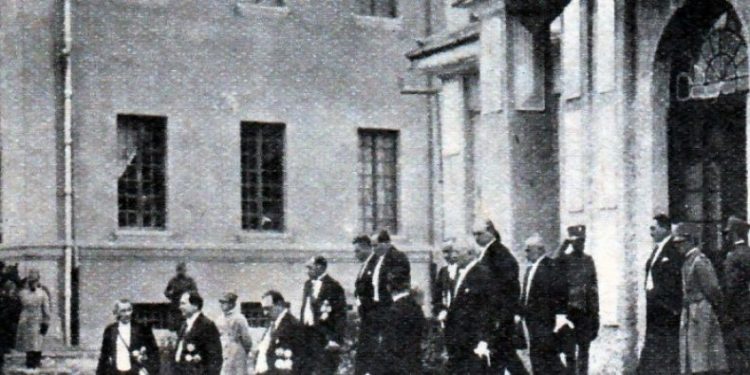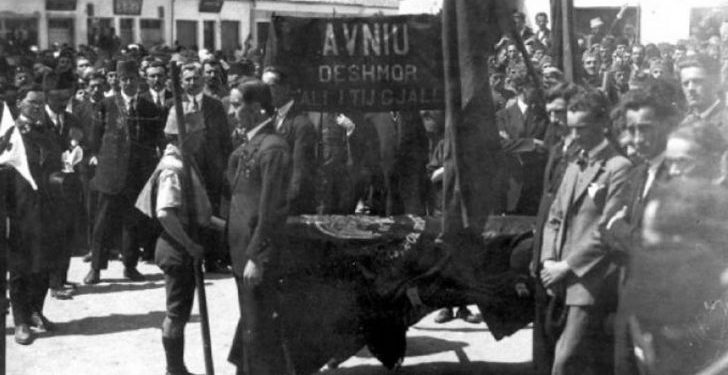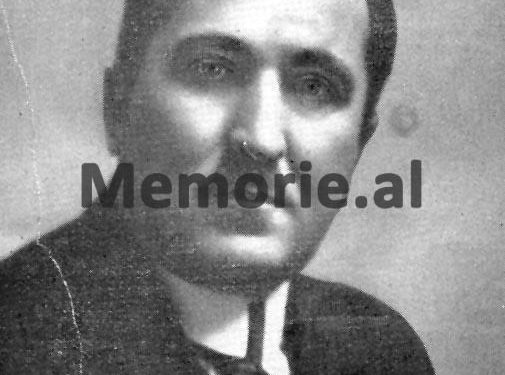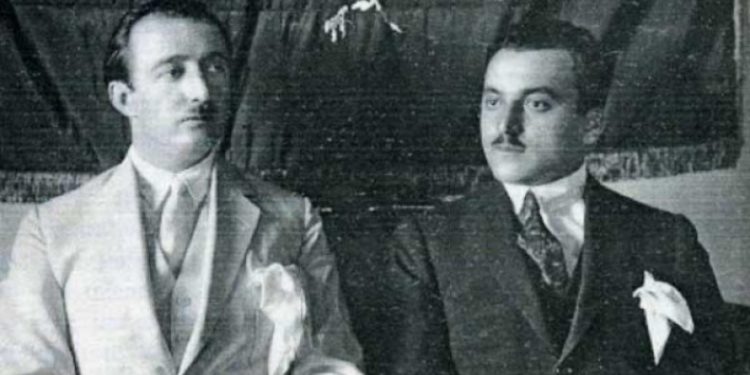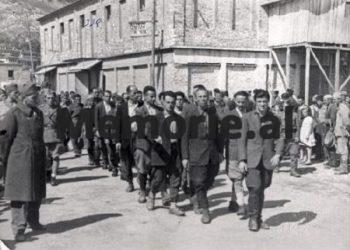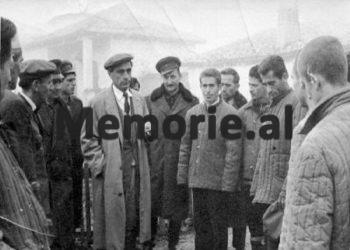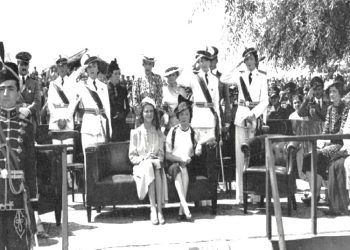Dashnor Kaloçi
Memorie.al publishes some of the most sensational incidents against top Albanian politicians abroad, starting with the assassination attempt on Paris and General Esat Pasha Toptan in 1920 by Avni Rustemi, the assassination of Avni on April 23, 1924. by the people of Toptan who paid a man from the Tirana family Reçi, the murder of Luigj Gurakuqi in 1925 in Bari, Italy by his cousin, Baltjan Istanbul, the murder of Ceno Beg Kryeziu on October 14, 1927 in Prague, Czech Republic by a student from Elbasan Alqivjadh Bebi, the failed assassination attempt on King Zog on February 20, 1931, where his loyal adjutant, Major Llesh Topollaj, was assassinated, the murder of Hasan Prishtina in Thessaloniki, Greece, on August 14, 1933, by the Albanian Ibrahim Çelo, until at the abduction of former Prime Minister Koço Kota in Thessaloniki, Greece, ordered by Enver Hoxha and carried out by the State Security led by Koci Xoxe. Enver Hoxha remains one of the only high-ranking politicians in Albania who “did not have a thorn in his side” during his visits abroad, even though he was burdened with “a mountain” of crimes and murders ?!
If we go back in history and look at what has happened during the last 120 years, we will notice that with our politicians outside Albania, serious events have occurred, with murders, injuries and kidnappings of some prime ministers, ministers, etc., as Albanian politicians have preferred to “solve” their problems with the “rifle butt”. Even the bullets of politics have not been missing even against the King of Albania, Ahmet Zogu, who was assassinated in Vienna, where his loyal adjutant, Major Llesh Topollaj, was killed. One of Albania’s only high-ranking politicians who did not suffer any incidents during their visits abroad was former communist dictator Enver Hoxha, who “did not have a thorn in his side”, although he was burdened by a mountain. “With crimes and murders.
1920 Murder of Esat Pasha in Paris
The story of the incidents with Albanian politicians outside Albania dates back to 1920, when Avni Rustemi shot with a revolver in Paris and killed General Esat Pasha Toptan, one of the most famous politicians of that time, who had served as Commissioner of Police in Thessaloniki, a member of the Turkish Parliament and later as Minister of Interior in the Government of Prince Vid in Albania, and had participated in one of the Albanian delegations to the Paris Peace Conference. Avni Rustemi was arrested by the French police after the murder and although he admitted the murder during the court hearings, he was released by the Paris Court in circumstances that remain unclear even today. After that event, Avni Rustemi returned to Albania, where he was received as a hero and was elected a member of the Albanian Parliament. At the time, it is said that Ahmet Zogu sent word to Avni Rustemi, warning him to be careful, as the Toptanas would find a man to pay for his murder, and Zogu would be accused of having a political opponent. . But Rustemi was not only not saved, but very proud and proud, he walked the streets of Tirana, with the lamb of Labëria’s shepherds holding his arms over the MP’s stylish suit. And so it really happened, Avni was killed on April 22, 1924, by the relatives of Esat Pasha Toptan, who pays a man who shot at him while he was walking with his close friend, Hoxha Kadri Prishtina, exactly in the place where the bust stands today in the square that bears his name, at the New Bazaar. That assassination served the opposition of that time, which used it politically and with its coffin on its side to organize an armed uprising to overthrow the legitimate government of Shefqet Vërlac, who emerged from the free parliamentary elections of that time. That event, from the historiography and propaganda of the communist regime of Enver Hoxha, is known as the “June Revolution” of 1924, which brought to power the Government of Fan Noli.
1925 The assassination of Luigj Gurakuqi in Bari
The next assassination attempt on Albanian politicians outside Albania was marked on March 2, 1925 in Bari, Italy, where Luigj Gurakuqi, who was one of the most famous Albanian politicians since Ismail Qemali’s government in 1912, was killed. , when he received the portfolio of the Minister of Finance. He later held the portfolio of Minister of Education, and in 1924, it was Fan Noli’s right-wing wing in the “June Revolution” that brought him to power. After Zog’s return to power in December 1924, as well as many other politicians who had taken part and led the armed uprising of June 1924, Gurakuqi left Albania and settled in Bari, Italy. The man who shot Gurakuqi was the son of his aunt, Balto Stambolla, who is said to have been instigated by Zog’s Interior Minister Ceno Beg Kryeziu, taking advantage of some family disputes they had between them. At the time, the anti-Zogist opposition that had emigrated outside Albania blamed Ahmet Zogu for killing Gurakuqi, but at the trial in Italy, Gurakuqi’s mother and brother stated that Zogu had no hand in killing his son and brother. them.
1927 Murder of Ceno Beg Kryeziu in Prague
One of the other incidents with Albanian politicians outside Albania was the one in the Czech capital, Prague, with the assassination of the Albanian ambassador, Ceno Beg Kryeziu, whose decree was signed that day by King Zog as Minister. almighty of Albania near the Czech Republic. Ceno Beg Kryeziu was from the well-known family of the Kryezijs of Kosovo and was married to one of Ahmet Zogu’s sisters, with whom he also had a son, named Tati. Ceno Begu was one of the people who supported Zog’s return to power in December 1924, and in the government formed in January 1925, Prime Minister Ahmet Zogu gave him the post of Interior Minister. During the time that Ceno Begu was in that post, the murders of Bajram Curri and Luigj Gurakuqi took place, which did not go unnoticed in Albanian politics, where the opposition of that time accused King Zog, who had ordered Ceno Begun to eliminate the two politicians. known. After some time, King Zog broke off relations with Ceno Begu and after dismissing him from the post of Minister of Interior, appointed him Minister of Power of Albania in Belgrade. Relations between Zog and his brother-in-law cooled even more, as Ceno Begu began pursuing a pro-Yugoslav policy to the detriment of the interests of Albania and Zog himself. After that, Zogu appointed Ceno Begun as a powerful Minister in the Czech Republic, where a few days later he was killed by an Albanian student named Alqiviadh Bebi from Elbasan. His murder took place on October 14, 1927, at ten o’clock at night, as Ceno Begu was entering his favorite Passage café on Vaclavski Names Square. Albanian student Alqiviadh Bebi, who had previously entered there and was drinking alone at the table, shot him several times with a pistol in the body and head, leaving him dead on the spot. After the murder, the student from Elbasan did not leave and the staff of the bar caught him and handed him over to the police. That murder at the time caused a great stir and was published by many European newspapers, which gave different versions of her motives, where there were also accusations against Zogu, who according to them had paid the Albanian student to kill him. his brother-in-law. The day the trial of Alqiviadh Bebi began in Prague, who admitted that he had committed the murder for political reasons, because according to him Ceno Begu had betrayed King Zog, his murder took place inside the courtroom, by Zija Vuciterni from Kosovo, who served as an adjutant to Gani Bey (Ceno’s brother) who shot Bebi several times with a pistol, who fell dead on the judge’s desk and other bullets wounded an Italian journalist. Zija Vuciterna acknowledged the authorship of the murder in his trial in Prague, saying: “I took revenge on my brother, Ceno Begu”.
1931 Attack on Zog in Vienna
The series of assassinations of senior Albanian politicians outside Albania, followed by that of Mbeti Zog in early 1931. At the time, King Zog, who was suffering from a serious illness and doctors had made him very alarming, decided to he went for treatment in Vienna, Austria, where at that time a part of the anti-Zogist political diaspora had settled, which had left Albania at the end of 1924, when Ahmet Zogu returned to power. Although many of the King’s close and loyal people advised him that going to the Austrian capital would have consequences, he did not listen to them and, moreover, decided to go there to challenge them. A few days after Zog left for Austria, on February 20, 1931, he decided to go to the Vienna Opera House, where the Aida Opera was performed that day, and that evening King Zog was accompanied by the Minister of the Court, Eqerem Bey. Libohova and his two adjutants, Colonel Zef Serreqi and Major Llesh Topollaj. As expected, the Albanian political diaspora in Vienna decided to assassinate King Zog, and volunteers Ndok Gjeloshi and Azis Çami, two former soldiers who had left Albania as anti-Zogists, volunteered to carry out the assassination attempt. Qazim Mulleti, a former member of the Albanian Parliament and a close associate of Fan Noli, was also their supporter in those assassinations. That night after Zog and the people accompanying him entered the Opera House, the King felt that something was being prepared for him and ordered his companions to bring his car to the back exit of the Opera House so that he could leave as much as possible. quickly from there. After the King’s car approached the back door of the hall, the first to appear was Major Llesh Topollaj, who was wearing the King’s uniform, and Ndok Gjeloshi, who had ambushed him in the park, accusing him of being King Zog, and shot several times with a pistol and killed him on the spot. At this time, Azis Çami also approached to shoot the others who were coming out, firing several times with a pistol at Zogu and Eqerem Libohova, who also responded, firing him five times with a pistol. While Azis Çami was shooting at Zogu and Eqerem Beun, he was hit by a pistol and Zogu’s other adjutant, Zef Serreqi, approached him and immediately disarmed him. From the noise that took place there, the local police immediately arrived and arrested the two assassins, Çami and Gjeloshi, who went on trial in Vienna, being convicted for the murder of Topollaj and the wounding of Libohova. The creator and perpetrator of that assassination, Hasan Prishtina, left Austria without falling into the hands of the Austrian police. This was the second failed assassination attempt on King Zog, as the one made to him by the young man from Mati, Beqir Valteri, on February 23, 1924, who was pushed by Luigj Gurakuqi and Avni Rustemi, could only injure him in the hand. King Bird. His assassin, King Zog, not only did not convict him, but after he told the two people who had pushed him, he awarded him a state scholarship and sent him to Vienna, Austria. From where he would return to the period of the occupation of the country, taking a post of minister (of Popular Culture), which “served” the communists to sentence him to death in the Special Court and to execute him.
1933 Hasan Prishtina’s assassination in Thessaloniki
The series of assassinations of Albanian politicians continued on August 14, 1933, with the assassination of Hasan Prishtina, in Thessaloniki, Greece. Hasan Prishtina was one of the well-known politicians of Albania since 1911-1924, who was elected three times as an MP in the Turkish Parliament, and then in the Albanian one, and held the post of Prime Minister of Albania in April. of 1921. Hasan Prishtina started his activity as a politician in Turkey and then in his hometown in Kosovo and Albania, where in 1913, he was elected a member of the Government of Ismail Qemali. During the years 1920-’24, Prishtina distinguished itself as a very active politician and after the return of Zog to power in 1924, he emigrated outside Albania, being one of the most determined opponents of King Zog, against whom he organized the assassination in 1931 in Vienna. Hasan Prishtina was killed in Thessaloniki by an assassination attempt in unclear circumstances, committed by an Albanian named Ibrahim Çelo, but the opposition at the time blamed the murder on Ahmet Zogu and Serbian circles, as he headed the Kosovo Defense Committee. Until the 1960s, Hasan Prishtina was considered a traitor in the history textbooks of Albania and then he was rehabilitated, and in 1977, his remains were brought from Greece to Albania and he was buried in the city of Kukës.
1945 Former Prime Minister Kota is abducted in Greece
Less than a year after the end of the war in Albania, former Prime Minister Koço Kota, who had been fleeing and staying in Greece since 1939 when he and King Zog left, was abducted by secret services. of the Albanian communist government headed by Nevzat Haznedari (later a major general) and drove into Albania in a van. For his abduction and behavior in Albania, the Albanian secret services were assisted by the Greek communists of the EAM, who at that time controlled a considerable territory of Greece, where the former Prime Minister of Albania also lived. Koço Kota was brought before the Special Court in Tirana, together with Padre Anton Harapi, and Sokrat Dodbiba, although his lawyer Dr. Spiro Stringa, argued with facts the innocence of his client, who had been Secretary of the Congress of Lushnja in 1920, he was sentenced to 25 years in prison, accused of being a “traitor to the Albanian people.” Koç Kota passed away in very suspicious circumstances in Burrel prison, shortly after he had gone there to serve his sentence.
1946 Enver Hoxha in Paris
When less than a year and a half had passed since Enver Hoxha came to power, in 1946, he attended and headed the Albanian delegation that was invited to the Paris Peace Conference, which also consisted of Hysni Kapo, Behar Shtylla and Kahreman Ylli, who were accompanied by Prof. Petraq Pepo who was in the role of journalist. To secure the high Albanian delegation, two Deputy Ministers of Interior, Myftar Tare and Vaskë Koleci, as well as the military attaché, Colonel Pëllumb Dishnica, were appointed. Since the end of the war, it was the first time that Enver Hoxha was trespassing in a Western country and his going there, by the State Security led by Koci Xoxe, was considered problematic at that time, because at that time in France and Italy were concentrated and a large number of anti-communist political immigrants, who had left Albania in November 1944. Enver Hoxha and the Albanian delegation after being received at the “Sharl-De Gol” airport by the people of the State Security The Directorate of Foreign Intelligence, which had previously been sent there camouflaged under the guise of a diplomat and had taken all security measures, was then escorted and housed at the Imperial Hotel. During the three weeks that Enver Hoxha stayed in Paris, he visited several different tourist spots and there were no problems from the Albanian anti-communist Albanian political diaspora that had gathered there in those days. In Paris, many Albanians from St. Etienne, Montpellier, Lyon, etc., who had emigrated there since the Monarchy period, had gone to meet Enver Hoxha in those days. According to the testimony of Colonel Myftar Tares, one of Enver Hoxha’s main escorts at the time in Paris, Albania’s communist leader did not receive any of the immigrants who had gone to meet him, because the risk was too great and he feared between them could penetrate any anti-communist fleeing from Albania. However, Enver Hoxha’s visit to Paris passed without any problems, and he remained the only senior Albanian politician who did not suffer any incidents during his visits abroad until 1960./Memorie.al




